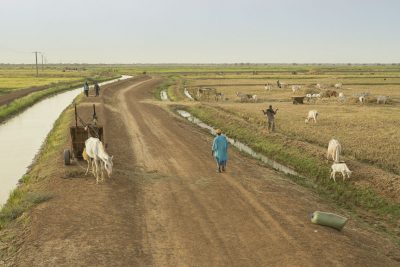
MCC's Economic Advisory Council met in late March for a rigorous discussion on how MCC analytics and operations can help meet international development’s biggest challenges.
Twenty internationally renowned development economists met to discuss challenges in international development and ways in which MCC could help to address the most pressing problems in line with its mandate and resources. Questions posed to the council were broad and called for fresh thinking about poverty reduction thorough growth, MCC’s guiding motto since its inception in 2004.
Among the many ideas and recommendations that EAC members raised, there were five take-aways that are particularly compelling in light of some of the emerging strategic directions the new leadership team has identified and the major challenges facing the post-COVID-19 developing world.
Grant financing. Unlike the much larger multilateral development banks, MCC offers pure grant support which is highly valued, particularly with high national debt levels in some countries. The EAC challenged MCC to think hard about how best to use this scarce resource, with ensuing debates about the merits of using grant funding for infrastructure development. It was suggested that grants should not go to investments the private sector could address but should rather target four types of development priorities where public funding is key: (i) to generate ‘external benefits’, such as environmental resilience or lowering greenhouse gases; (ii) to support social equity, for example investing in public services in lagging regions where few households have access and outmigration is difficult; (iii) to support innovation and learning with investments that hold promise for advancing national priorities; and (iv) to address cross-border investments that require integrated regional solutions.
Sustainability. The gold standard for development success is sustainable, inclusive, and resilient economic performance. This brings climate change into focus for the threat it poses to present and future generations, most notably the poor. The EAC suggested that MCC needs to sharpen its analytic methods to capture complex interactions by revising MCC’s high discount rate (10 percent) downwards since it poses a bias against long term investments; modifying diagnostic tools to reflect external benefits such as greenhouse gas reduction; and addressing bad policies that impede transition, such as subsidies to fossil fuels. MCC should also consider diagnostic tools to examine structural transition in addition to its focus on binding constraints to growth.
Inclusion. MCC has long recognized the critical role of growth in driving long term poverty reduction. But ensuring that GDP growth reaches the most vulnerable is not a given. Without measures to encourage ‘quality’ growth that promotes employment, expands access to public services, and addresses gender, ethnic, or regional imbalances, growth will not be as effective in reducing poverty. MCC needs to build this purposefully into its analytic methods, country dialogue, and program designs to seek greater inclusion.
The digital economy. MCC has a demonstrated strength in providing core physical infrastructure critical to growth: transport, power, and water management. But the direction of global commerce, underscored by the pandemic, requires access to digital infrastructure, including broadband services and the skills to participate in the digital economy. Digital access also has important indirect impacts on education, health care, agriculture, a vibrant civil society, and disaster management. Recognizing the importance of digital infrastructure for inclusive and productive growth, it was suggested that MCC should strive to support digital connectivity, capacity (both of the government and of workers), and sound regulation and policy where there are gaps.
Eligibility and procedures. MCC has a carefully defined scorecard system and procedures for determining countries that may be eligible for grant assistance. To increase MCC’s impact and reach, consistent with USG priorities in well governed countries, the EAC recommended modifying select parameters: (i) extend compact length (currently five years) in recognition of the fact that most complex reforms take much longer; (ii) revise GDP per capita eligibility cut-offs to consider income volatility, distribution, and non-income indicators of poverty such as access to basic services; (iii) revisit the practice of restricting countries to two compacts; (iv) bring in climate change and climate vulnerability, as a criterion to define and advance Nationally Determined Commitments under MCC’s Threshold Programs. There was significant interest in exploring MCC’s ability to work at the subnational level as well, with a focus on regions that are lagging irrespective of national income level.
Not all EAC members agreed on each point and there were some robust debates during the discussion. In the same vein, the recommendations made and advice offered will not all directly translate into MCC’s strategic direction. But we did get rich food for thought and many compelling arguments were made for revisiting MCC’s methodological practice and tools, building on the strong commitment to evidence based decision making that was established with its foundation.

